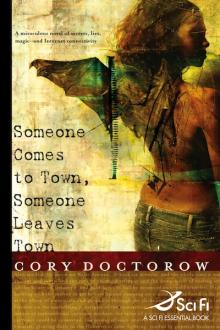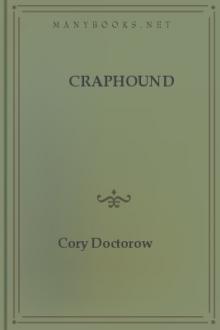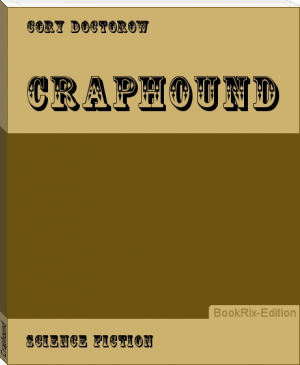Someone Comes to Town, Someone Leaves Town by Cory Doctorow (graded readers TXT) 📕

- Author: Cory Doctorow
- Performer: 0765312786
Book online «Someone Comes to Town, Someone Leaves Town by Cory Doctorow (graded readers TXT) 📕». Author Cory Doctorow
"It's nice," Alan said, "but you look like you could use some books."
She crossed her eyes. "Books? Sure -- I've got ten boxes of them in the basement. You can come by and help me unpack them."
"Ten boxes?" Alan said. "You're making that up." Ten boxes of books! Things like books didn't last long under the mountain, in the damp and with the ever-inquisitive, ever-destructive Davey exploring every inch of floor and cave and corridor in search of opportunities for pillage.
"I ain't neither," she said. "At least ten. It was a grand flat and they were all in alphabetical order, too."
"Can we go see?" Alan asked, getting up from the sofa.
"See boxes?"
"Yes," Alan said. "And look inside. We could unbox them after dinner, okay?"
"That's more of an afternoon project," said a voice from the top of the stairs.
"That's my Da," she said. "Come down and introduce yourself to Alan, Da," she said. "You're not the voice of God, so you can bloody well turn up and show your face."
"No more sass, gel, or it will go very hard for you," said the voice. The accent was like Marci's squared, thick as oatmeal, liqueur-thick. Nearly incomprehensible, but the voice was kind and smart and patient, too.
"You'll have a hard time giving me any licks from the top of the stairs, Da, and Alan looks like he's going to die if you don't at least come down and say hello."
Alan blushed furiously. "You can come down whenever you like, sir," he said. "That's all right."
"That's mighty generous of you, young sir," said the voice. "Aye. But before I come down, tell me, are your intentions toward my daughter honorable?"
His cheeks grew even hotter, and his ears felt like they were melting with embarrassment. "Yes, sir," he said in a small voice.
"He's a dreadful pervert, Da," Marci said. "You should see the things he tries, you'd kill him, you would." She grinned foxish and punched him in the shoulder. He sank into the cushions, face suddenly drained of blood.
"What?" roared the voice, and there was a clatter of slippers on the neutral carpet of the stairs. Alan didn't want to look but found that he couldn't help himself, his head inexorably turned toward the sound, until a pair of thick legs hove into sight, whereupon Marci leapt into his lap an threw her arms around his neck.
"Ge'orff me, pervert!" she said, as she began to cover his face in darting, pecking kisses.
He went rigid and tried to sink all the way into the sofa.
"All right, all right, that's enough of that," her father said. Marci stood and dusted herself off. Alan stared at his knees.
"She's horrible, isn't she?" said the voice, and a great, thick hand appeared in his field of vision. He shook it tentatively, noting the heavy class ring and the thin, plain wedding band. He looked up slowly.
Marci's father was short but powerfully built, like the wrestlers on the other kids' lunchboxes at school. He had a shock of curly black hair that was flecked with dandruff, and a thick bristling mustache that made him look very fierce, though his eyes were gentle and bookish behind thick glasses. He was wearing wool trousers and a cable-knit sweater that was unraveling at the elbows.
"Pleased to meet you, Albert," he said. They shook hands gravely. "I've been after her to unpack those books since we moved here. You could come by tomorrow afternoon and help, if you'd like -- I think it's the only way I'll get herself to stir her lazy bottom to do some chores around here."
"Oh, Da!" Marci said. "Who cooks around here? Who does the laundry?"
"The take-away pizza man does the majority of the cooking, daughter. And as for laundry, the last time I checked, there were two weeks' worth of laundry to do."
"Da," she said in a sweet voice, "I love you Da," she said, wrapping her arms around his trim waist.
"You see what I have to put up with?" her father said, snatching her up and dangling her by her ankles.
She flailed her arms about and made outraged choking noises while he swung her back and forth like a pendulum, releasing her at the top of one arc so that she flopped onto the sofa in a tangle of thin limbs.
"It's a madhouse around here," her father continued as Marci righted herself, knocking Alan in the temple with a tennis shoe, "but what can you do? Once she's a little bigger, I can put her to work in the mines, and then I'll have a little peace around here." He sat down on an overstuffed armchair with a fussy antimacassar.
"He's got a huge life-insurance policy," Marci said conspiratorially. "I'm just waiting for him to kick the bucket and then I'm going to retire."
"Oh, aye," her father said. "Retire. Your life is an awful one, it is. Junior high is a terrible hardship, I know."
Alan found himself grinning.
"What's so funny?" Marci said, punching him in the shoulder.
"You two are," he said, grabbing her arm and then digging his fingers into her tummy, doubling her over with tickles.
There were twelve boxes of books. The damp in the basement had softened the cartons to cottage-cheese mush, and the back covers of the bottom layer of paperbacks were soft as felt. To Alan, these seemed unremarkable -- all paper under the mountain looked like this after a week or two, even if Doug didn't get to it -- but Marci was heartbroken.
"My books, my lovely books, they're roont!" she said, as they piled them on the living room carpet.
"They're fine," Alan said. "They'll dry out a little wobbly, but they'll be fine. We'll just spread the damp ones out on the rug and shelve the rest."
And that's what they did, book after book -- old books, hardcover books, board-back kids' books, new paperbacks, dozens of green- and orange-spined Penguin paperbacks. He fondled them, smelled them. Some smelled of fish and chips, and some smelled of road dust, and some smelled of Marci, and they had dog ears where she'd stopped and cracks in their spines where she'd bent them around. They fell open to pages that had her favorite passages. He felt wobbly and drunk as he touched each one in turn.
"Have you read all of these?" Alan asked as he shifted the John Mortimers down one shelf to make room for the Ed McBains.
"Naw," she said, punching him in the shoulder. "What's the point of a bunch of books you've already read?"
She caught him in the schoolyard on Monday and dragged him by one ear out to the marshy part. She pinned him down and straddled his chest and tickled him with one hand so that he cried out and used the other hand to drum a finger across his lips, so that his cries came out "bibble."
Once he'd bucked her off, they kissed for a little while, then she grabbed hold of one of his nipples and twisted.
"All right," she said. "Enough torture. When do I get to meet your family?"
"You can't," he said, writhing on the pine needles, which worked their way up the back of his shirt and pricked him across his lower back, feeling like the bristles of a hairbrush.
"Oh, I can, and I will," she said. She twisted harder.
He slapped her hand away. "My family is really weird," he said. "My parents don't really ever go out. They're not like other people. They don't talk." All of it true.
"They're mute?"
"No, but they don't talk."
"They don't talk much, or they don't talk at all?" She pronounced it a-tall.
"Not at all."
"How did you and your brothers learn to talk, then?"
"Neighbors." Still true. The golems lived in the neighboring caves. "And my father, a little." True.
"So you have neighbors who visit you?" she asked, a triumphant gleam in her eye.
Damn. "No, we visit them." Lying now. Sweat on the shag of hair over his ears, which felt like they had coals pressed to them.
"When you were a baby?"
"No, my grandparents took care of me when I was a baby." Deeper. "But they died." Bottoming out now.
"I don't believe you," she said, and he saw tears glisten in her eyes. "You're too embarrassed to introduce me to your family."
"That's not it." He thought fast. "My brother. David. He's not well. He has a brain tumor. We think he'll probably die. That's why he doesn't come to school. And it makes him act funny. He hits people, says terrible things." Mixing truth with lies was a lot easier. "He shouts and hurts people and he's the reason I can't ever have friends over. Not until he dies."
Her eyes narrowed. "If that's a lie," she said, "it's a terrible one. My Ma died of cancer, and it's not something anyone should make fun of. So, it better not be a lie."
"It's not a lie," he said, mustering a tear. "My brother David, we don't know how long he'll live, but it won't be long. He acts like a monster, so it's hard to love him, but we all try."
She rocked back onto her haunches. "It's true, then?" she asked softly.
He nodded miserably.
"Let's say no more about it, then," she said. She took his hand and traced hieroglyphs on his palm with the ragged edges of her chewed-up fingernails.
The recess bell rang and they headed back to school. They were about to leave the marshland when something hard hit Alan in the back of the head. He spun around and saw a small, sharp rock skitter into the grass, saw Davey's face contorted with rage, lips pulled all the way back off his teeth, half-hidden in the boughs of a tree, winding up to throw another rock.
He flinched away and the rock hit the paving hard enough to bounce. Marci whirled around, but David was gone, high up in the leaves, invisible, malicious, biding.
"What was that?"
"I dunno," Alan lied, and groaned.
Kurt and Alan examined every gap between every storefront on Augusta, no matter how narrow. Kurt kept silent as Alan fished his arm up to the shoulder along miniature alleys that were just wide enough to accommodate the rain gutters depending from the roof.
They found the alley that Frederick had been dragged down near the end of the block, between a mattress store and an egg wholesaler. It was narrow enough that they had to traverse it sideways, but there, at the entrance, were two smears of skin and blood, just above the ground, stretching off into the sulfurous, rotty-egg depths of the alleyway.
They slid along the alley's length, headed for the gloom of the back. Something skittered away from Alan's shoe and he bent down, but couldn't see it. He ran his hands along the ground and the walls and they came back with a rime of dried blood and a single strand of long, oily hair stuck to them. He wiped his palms off on the bricks.
"I can't see," he said.
"Here," Kurt said, handing him a miniature maglight whose handle was corrugated by hundreds of toothmarks. Alan saw that he was intense, watching.
Alan twisted the light on. "Thanks," he said, and Kurt smiled at him, seemed a little taller. Alan looked again. There, on the ground, was a sharpened black tooth, pierced by a piece of pipe-cleaner wire.
He pocketed the tooth before Kurt saw it and delved farther, approaching the alley's end,





Comments (0)